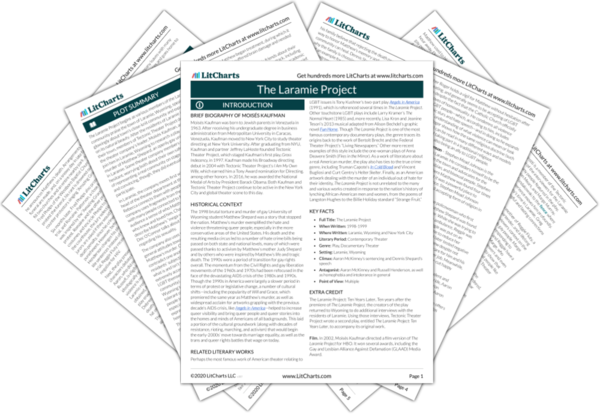Summary
Analysis
Sergeant Hing asks himself how what happened to Matthew could happen in Laramie, noting that there is a very active gay community in Laramie compared to the rest of Wyoming, and it is “live and let live.” Laramie resident Jeffrey Lockwood then talks about how he had hoped the killers were not from Laramie, saying they don’t raise children like that here. He then backtracks to say that clearly they do raise children like that in Laramie. Catherine Connolly talks about how the arraignment profoundly disturbed her and her feeling of safety. Jon Peacock states that, as more and more details about the murder came out, loads of reporters came to Laramie.
When Sergeant Hing struggles to reconcile what he sees as Laramie’s tolerant policy of “live or let live” with the reality of Matthew’s homophobic murder, and when Jeffrey admits that he hoped the criminals were out-of-towners, the readers sees Laramie residents confronting the reality of what happened to Matthew and begin to change how they see the morality of their community’s attitude towards gay people as a result.
Themes
Jedadiah Schultz discusses his confusion about reconciling his personal beliefs with the doctrine of his church. At church, the Reverend tells him that homosexuality is wrong, but Jedadiah feels conflicted. Although he does not think he agrees with homosexuality, he states that he does not hate gay people, and would not let someone else’s sexuality come between him and that person.
Conrad Miller, another Laramie resident, maintains his strong objection to homosexuality, saying he would tell his children it is “what animals do.” Murdock Cooper, another resident, says that there are more gay people in Laramie than meets the eye, and he thinks that Matthew Shepard is partially to blame for his own death because he came onto Aaron McKinney and Russell Henderson. Murdock says that believing this makes him “feel better.”
In contrast to Jedadiah’s struggle to understand how to accept gay people and still be a part of his church, Conrad Miller and Murdock Cooper display varying degrees of unrepentant homophobia. Murdock seems to use homophobic stereotypes as a way to process the murder, which would otherwise be hard for him to reconcile with his worldview.
Themes
Next, the narrator introduces Zackie Salmon, who identifies as a lesbian and says that, in the wake of Matthew Shepard’s murder, she fears for her safety and would be afraid to show affection for her partner in public. Jonas Slonaker, another gay Laramie resident, talks about the Western idea of “live and let live,” saying it is “such crap” because it forces gay people to be silent or else risk being beat up.
Following expressions of homophobia, the playwrights give the floor to people who are the targets of this bigotry. Zackie and Jonas, both LGBT, give their perspective on the fear they experience after Matthew’s murder and their frustration with how homophobia stifles them in less visible ways.
Themes
Get the entire The Laramie Project LitChart as a printable PDF.













